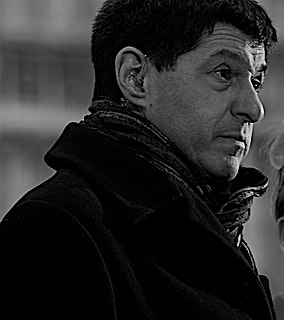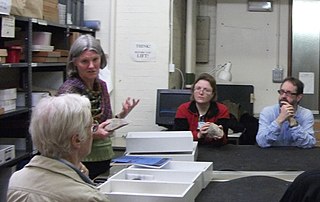Ancient Egyptian religion was a complex system of polytheistic beliefs and rituals that formed an integral part of ancient Egyptian culture. It centered on the Egyptians' interactions with many deities believed to be present in, and in control of the world. Rituals such as prayer and offerings were provided to the gods to gain their favor. Formal religious practice centered on the pharaohs, the rulers of Egypt, believed to possess divine powers by virtue of their positions. They acted as intermediaries between their people and the gods, and were obligated to sustain the gods through rituals and offerings so that they could maintain Ma'at, the order of the cosmos, and repel Isfet, which was chaos. The state dedicated enormous resources to religious rituals and to the construction of temples.

The Löwenmensch figurine, also called the Lion-man or the Lion-human of Hohlenstein-Stadel, is a prehistoric ivory sculpture discovered in Hohlenstein-Stadel, a German cave in 1939. The German name, Löwenmensch, meaning "lion-person" or "lion-human", is used most frequently because it was discovered and is exhibited in Germany.
Film '71 – Film 2018 was a British film review television programme, which was usually broadcast on BBC One. The title of the show changed each year to incorporate the year of broadcast until its cancellation in December 2018.

Robert Neil MacGregor is a British art historian and former museum director. He was editor of the Burlington Magazine from 1981 to 1987, then Director of the National Gallery, London, from 1987 to 2002, Director of the British Museum from 2002 to 2015, and founding director of the Humboldt Forum in Berlin until 2018.
Brett Westwood is a radio presenter and author, specialising in natural history. He regularly presents episodes of BBC Radio 4's series The Living World and Nature, as well as his own short series, several of which are available from the BBC website. He is a co-presenter with Philippa Forrester of World on the Move, a BBC Radio 4 series that started in 2008 on migration in the animal kingdom. He is active in the West Midland Bird Club, Worcestershire Wildlife Trust, and for the Worcestershire Biological Records Centre, which all cover the area around his home town of Stourbridge.

Jonathan B. Sopel is a British journalist, television presenter and a former correspondent for BBC News. He was formerly the BBC's North America editor; chief political correspondent for the domestic news channel BBC News; a presenter on the Politics Show on BBC One and the BBC News channel; and from 2013 to 2014, the main presenter on Global, on BBC World News.

Leeds Student Radio is a student radio station broadcasting every day during term time from Leeds University Union at the University of Leeds. It is also the official student radio station for Leeds Trinity University and Leeds College of Music. The station broadcasts online through its website.

The Younger Memnon is an Ancient Egyptian statue, one of two colossal granite heads from the Ramesseum mortuary temple in Thebes, Upper Egypt. It depicts the Nineteenth Dynasty Pharaoh Ramesses II wearing the Nemes head-dress with a cobra diadem on top. The damaged statue has since lost its body and lower legs. It is one of a pair that originally flanked the Ramesseum's doorway. The head of the other statue is still found at the temple.
The Film Programme was a British film review radio programme, broadcast weekly on BBC Radio 4, from 2004 to 2021, presented by Francine Stock.

A History of the World in 100 Objects was a joint project of BBC Radio 4 and the British Museum, consisting of a 100-part radio series written and presented by British Museum director Neil MacGregor. In 15-minute presentations broadcast on weekdays on Radio 4, MacGregor used objects of ancient art, industry, technology and arms, all of which are in the British Museum's collections, as an introduction to parts of human history. The series, four years in planning, began on 18 January 2010 and was broadcast over 20 weeks. A book to accompany the series, A History of the World in 100 Objects by Neil MacGregor, was published by Allen Lane on 28 October 2010. The entire series is also available for download along with an audio version of the book for purchase. The British Museum won the 2011 Art Fund Prize for its role in hosting the project.

Hornedjitef was an ancient Egyptian priest in the Temple of Amun at Karnak during the reign of Ptolemy III. He is known from his elaborate coffins, mummy mask and mummy, dating from the Early Ptolemaic Period and excavated from Asasif, Thebes, Egypt, which are all held in the British Museum. These related objects were chosen as the first of the hundred objects selected by British Museum Director Neil MacGregor in the 2010 BBC Radio 4 series A History of the World in 100 Objects.

The Double-headed serpent is an Aztec sculpture. It is a snake with two heads composed of mostly turquoise pieces applied to a wooden base. It came from Aztec Mexico and might have been worn or displayed in religious ceremonies. The mosaic is made of pieces of turquoise, spiny oyster shell and conch shell. The sculpture is at the British Museum.
The Living World is a long-running natural history radio programme, made by the BBC and broadcast on its Radio 4. The series was created at the BBC Natural History Unit by Dilys Breese and Derek Jones, initially as a 52-week series, in 1968. It chiefly covers topics related to the flora and fauna of the British Isles, with occasional forays further afield, such as a 1997 episode on the wildlife of the Rock of Gibraltar.
A Poet in New York is a British drama television film that was first broadcast, in a 60-minute version, by BBC One Wales on 30 April 2014. A longer 75-minute version was later broadcast by BBC Two on 18 May 2014. The film, written by Andrew Davies and directed by Aisling Walsh, explores how Welsh poet Dylan Thomas died in New York at the age of 39. The film was made to mark the centenary of Thomas' birth on 27 October 1914.
Burt Caesar is a British actor, broadcaster and director for stage and television, who was born in St Kitts and migrated to England with his family as a child. His career has encompassed acting in Bond films, stage performances including in Shakespearian roles, and many plays for BBC Radio 4. Caesar regularly works as a director and is an artistic advisor at the Royal Academy of Dramatic Art (RADA). He is also a commentator on theatre and literature.
Antonia Quirke is a British film critic. As well as writing on film for the Financial Times and a weekly column for the New Statesman, she has presented regularly on The Film Programme, Pick of the Week, BBC Radio 4, as well as Film... and The One Show on BBC One.

Jill Cook is a British museum curator who is the acting Keeper of the Department of Britain, Europe and Prehistory at the British Museum. She curates the collection of European Prehistory and is a specialist in Ice Age art and the archaeology of human evolution.

Brexitcast is a British political talkshow and television programme produced by BBC Radio 5 Live and BBC News. It was launched on 5 June 2017 following the success of Electioncast, a podcast that had covered that year's general election. Originally aired on radio, it was announced on 3 June 2019 that Brexitcast had been commissioned as a television programme for BBC One. It was the first BBC podcast to be commissioned for television.

The Hurricane Tapes is a 13-part BBC World Service podcast series, released in 2019, discussing in detail the case of Rubin Carter, an American-Canadian middleweight boxer, wrongfully convicted twice of murder in 1966 and 1976 respectively and later released following a petition of habeas corpus in 1985 after serving almost 20 years in prison.
Soul Music is a music documentary series on BBC Radio 4 first broadcast in November 2000 which aims to focus on the emotional impact of famous pieces of music. The works chosen can be anything from classical, popular, jazz or religious. The first episode examined Sir Edward Elgar's Cello Concerto in E minor.











